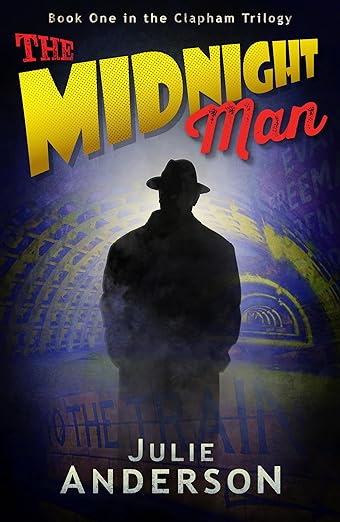Winter 1946
One cold dark night, as a devastated London shivers through the transition to post-war life, a young nurse goes missing from the South London Hospital for Women & Children. Her body is discovered hours later behind a locked door.
Two women from the hospital join forces to investigate the case. Determined not to return to the futures laid out for them before the war, the unlikely sleuths must face their own demons and dilemmas as they pursue - The Midnight Man.
BEWARE THE DARKNESS BENEATH
It's such a pleasure to be sharing my review of The Midnight Man today. Many thanks to Julie Anderson and Hobeck Books for sending me an advance copy of the novel.
Having been a huge admirer of Julie Anderson's contemporary Cassandra Fortune series, I was delighted to learn she is turning her hand to historical fiction with her new Clapham trilogy, starting with The Midnight Man and it's immediately obvious that she has written another first-rate series. Her immersive sense of time and place is exemplary and the research that clearly went into writing this book is evident from start to finish, without ever distracting from the storyline. The narrative follows two women, Faye and Eleanor and the character-driven plot is engrossing as the similarities between the outwardly different pair emerge too.
Faye started working in the South London Hospital for Women & Children in 1934 when she was fifteen; it was her fourth job since leaving school and the place where she finally fitted in. It's now 1946, she has risen to the position of canteen manager and is fiercely loyal to the hospital. Therefore, her first impressions of Eleanor – Ellie – aren't promising. However, her innate sense of compassion soon comes to the fore as she offers the straitened young woman a lifeline.
Eleanor comes from a more privileged background than Faye but having recently worked at the Nuremberg Trials as a legal clerk, a series of events has meant her previously ordered life is now anything but. Both women are capable and ambitious but both constrained by their family and societal expectations. With the men now back, positions for women have become limited again and it’s these insights into post-war life which helps to ensure The Midnight Man is such an evocative read. The character development is excellent, with both Faye and Eleanor given fascinating backgrounds which also promise much as the trilogy progresses.
Faye's home life allows for a poignant reminder of what it was like before the formation of the NHS and how even working families were driven to wretched circumstances due to rising medical costs. Julie Anderson explores the various attitudes towards Bevan's National Health Service Act, including the reluctance of many in the medical profession but there is hope here too, strengthened further by the medical advancements. Meanwhile, the other characters are also distinctly imagined, and between them offer an authentic reflection of the issues faced and the attitudes of this period.
The brutal murder of a nurse changes everything; Eleanor overheard the victim arguing with somebody but the police are convinced the killer was a man passing through and are reluctant to follow up on her report. The two women are convinced otherwise, and as they join forces to investigate themselves, the mystery which unfolds is a brilliantly complex tale filled with potential suspects, red herrings and a rising sense of tension as they grow closer to discovering the identity of The Midnight Man. The closing chapters are particularly gripping and the scenes which give us an insight into a hidden part of London are nail-bitingly intense.
The South London Hospital for Women & Children existed until 1984 and although The Midnight Man is a work of fiction, Julie Anderson's commitment to accuracy whenever possible means its position within the local community is rendered vividly throughout. A compulsively atmospheric, suspenseful and illuminating historical mystery – The Midnight Man is a superb read and I highly recommend it.
The Midnight Man is published by Hobeck Books. It can be purchased from the publisher's website, Hive, Waterstones, Amazon or ordered from your favourite bookshop.
About the Author
Julie Anderson is the CWA Dagger listed author of three Whitehall thrillers and a short series of historical adventure stories for young adults. Before becoming a crime fiction writer, she was a senior civil servant, working across a variety of departments and agencies, including the Office of the Deputy Prime Minister. Unlike her protagonists, however, she doesn’t know where (all) the bodies are buried.
She writes crime fiction reviews for Time and Leisure Magazine and is a co-founder and Trustee of the Clapham Book Festival.
She lives in south London where her latest crime fiction series is set, returning to her first love of writing historical fiction with The Midnight Man, to be published by Hobeck.



Comments
Post a Comment